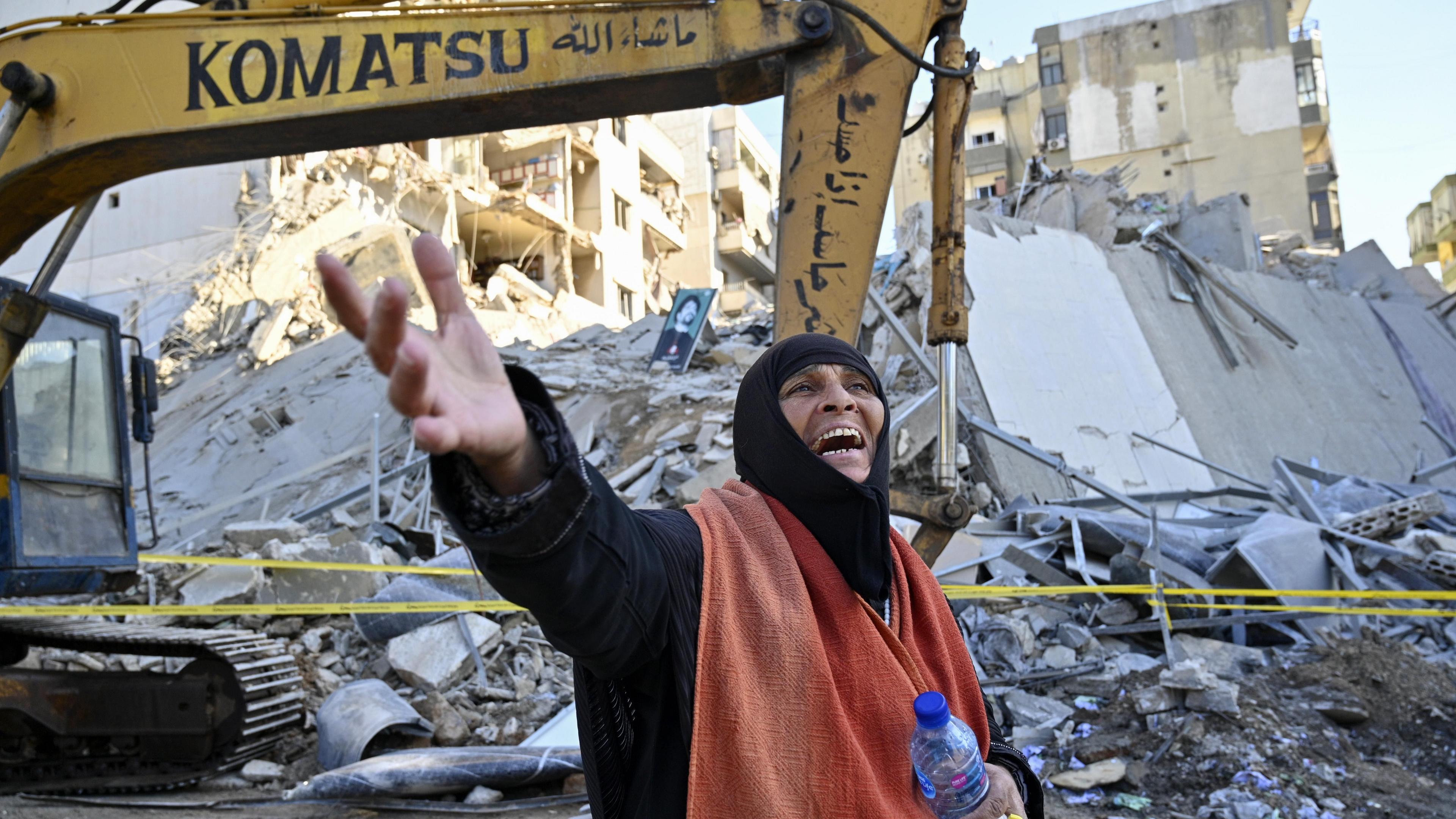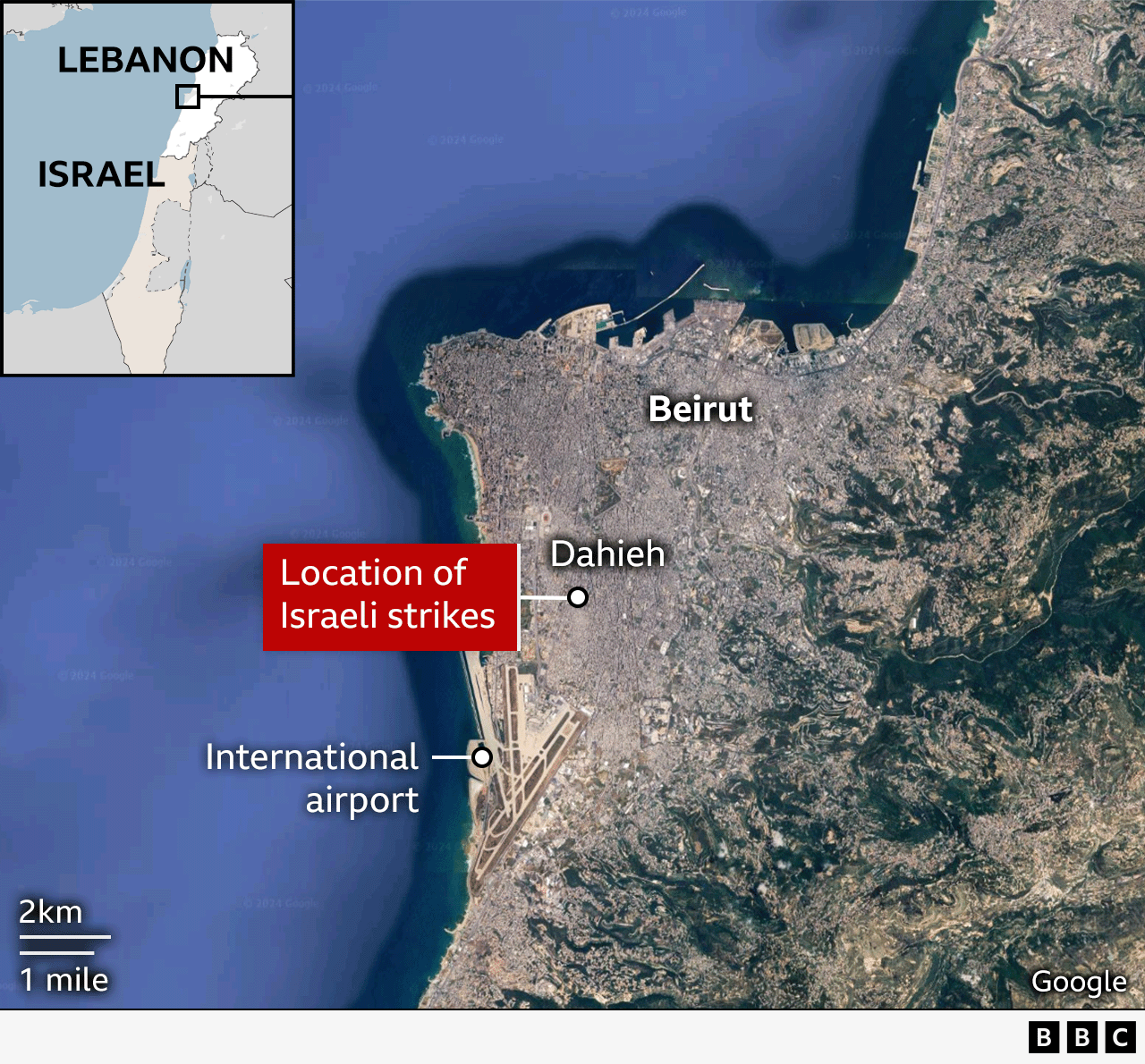Israeli strikes target Hezbollah-linked financial association in Lebanon
- Published
Israel has carried out air strikes targeting branches of a financial association linked with Hezbollah in the southern suburbs of Lebanon’s capital Beirut, as well as the south and east of the country.
There were chaotic scenes in parts of Beirut late on Sunday, as people tried to get to areas that they thought would be safer and multiple explosions were heard.
The Israeli military said it targeted money held by Al-Qard Al-Hassan Association (AQAH). It offers financial services to civilians in areas where Hezbollah has strong support, but Israel and the US accuse it of being a cover for the Iran-backed group to fund its activities.
There was no immediate comment from AQAH or Hezbollah.
The attacks appeared to mark an expansion of Israel’s war against Hezbollah, going beyond military infrastructure used by the group.
They took place hours before US President Joe Biden’s special envoy to the Middle East arrived in Beirut to explore the possibility of a negotiated end to the war.
Israel began an intense air campaign and ground invasion against Hezbollah after almost a year of cross-border fighting sparked by the war in Gaza, saying it wanted to ensure the safe return of tens of thousands of residents of Israeli border areas displaced by rocket attacks.
Hezbollah began firing rockets into northern Israel in support of Palestinians on 8 October 2023, the day after its ally Hamas’s deadly attack on Israel.
More than 2,400 people have been killed in Lebanon since then, including 1,800 in the past five weeks, according to the country’s health ministry. Israeli authorities say 59 people have been killed in northern Israel and the occupied Golan Heights.
‘No life left there’: The suburbs bearing the brunt of Israel’s strikes on Beirut
- Published21 October 2024
Netanyahu says he is undeterred after reported drone attack on his home
- Published19 October 2024
Israel-Hezbollah conflict in maps: Where is fighting happening in Lebanon?
- Published27 November 2024
The Israeli air strikes targeting branches of AQAH happened about 20 minutes after the Israeli military issued evacuation orders, at around 21:30 local time (18:30 GMT) on Sunday.
According to the Lebanon’s state-run National News Agency (NNA), there were 11 attacks on Dahieh, in southern Beirut.
Videos posted on social media showed one AQAH branch on fire in the Laylaki area, external, only 500m (1,800ft) away from the runway of Lebanon’s only functioning commercial airport, and another just to the north in Burj al-Barajneh. A third video showed a multi-storey building where there was an AQAH branch collapsing in the Chiyah area, external.
The NNA also said that strikes hit branches in Nabatieh, Tyre and Shehabieh in southern Lebanon, as well as those in the eastern Bekaa Valley towns of Baalbek, Hermel and Rayak - areas where Hezbollah has a strong presence.
"Our store and our livelihood are gone,” business owner Ahmed told Reuters news agency outside a severely damaged AQAH branch in Zahrani. “This neighbourhood is all civilian, with nothing here.”
It was not clear whether the strikes targeting AQAH caused any casualties. But the NNA reported on Monday that six women and children were killed in an air strike on a home in Baalbek, and that two bodies were recovered from a destroyed building in the southern town of Srifa.

A multi-storey building in the Beirut suburb of Chiyah was destroyed by a strike
The Israeli military said in a statement that it had struck “dozens of facilities and sites” across Lebanon that were used by Hezbollah to “finance its terrorist activities”.
It alleged that Hezbollah stored billions of dollars at branches of AQAH, and that it used the money to purchase weapons and pay members of its military wing.
“The purpose of these strikes is to target the ability of Hezbollah to function both during the war but also afterwards, to rebuild and to rearm the organisation on the day after, and [to target] the grip Hezbollah has on large parts of the Lebanese society,” an Israeli intelligence official told reporters.
Hezbollah - which is proscribed as a terrorist organisation by Israel, the UK, US and others - is more than just a Shia Islamist armed group. It is also a political party with representation in parliament, and a social movement, engrained in Lebanese society, with significant support.
AQAH is a key part of Hezbollah’s social services network. Before the Israeli strikes, it had more than 30 branches, often located on the ground floor of residential buildings.
Many people came to depend on AQAH after Lebanon sank into a deep economic crisis five years ago, causing the local currency to lose 90% of its value and commercial banks to restrict foreign currency withdrawals. The association allowed people to take out small, interest-free loans in dollars backed by gold or a guarantor, and to open savings accounts.
Hezbollah’s late leader, Hassan Nasrallah, said in a speech in 2021 that AQAH had provided $3.7bn (£2.8bn) in loans to 1.8 million people in Lebanon since it was founded in the early 1980s, and that around 300,000 people had loans with it at that time.
Nasrallah also claimed that AQAH had been strengthened by the US sanctions imposed since 2007, when American officials said the association was being used by Hezbollah as a cover to manage its financial activities and to gain access to the international financial system.
A Hezbollah press officer told the BBC on Monday afternoon that neither the group nor AQAH had issued any statements regarding the air strikes.
Earlier, a statement attributed to AQAH was circulated on social media which said people's deposits with the association were “safe”.

The Israeli military also announced on Monday that its troops were continuing to carry out operations in southern Lebanon to dismantle Hezbollah infrastructure and weaponry.
Hezbollah fighters meanwhile continued to fire rockets into northern Israel, with the military reporting that 60 projectiles had crossed the border by Monday afternoon.
About 200 projectiles were detected on Sunday, when the military said its warplanes had conducted "an intelligence-based strike on a command centre of Hezbollah's intelligence headquarters and an underground weapons workshop in Beirut".
Also on Sunday, the United Nations Interim Force in Lebanon (Unifil) accused Israeli forces of deliberately demolishing an observation tower and perimeter fence of a UN peacekeeping position in the southern town of Marwahin. It followed similar incidents in recent weeks.
In a separate development, the Lebanese army said three of its soldiers were killed after a military vehicle was hit by an Israeli air strike in Nabatieh, southern Lebanon.
Lebanon's army has historically stayed out of cross-border clashes between Israel and Hezbollah - but a number of its troops have been killed in Israeli attacks since fighting escalated last month.
The Israeli military has not yet commented on the two incidents.